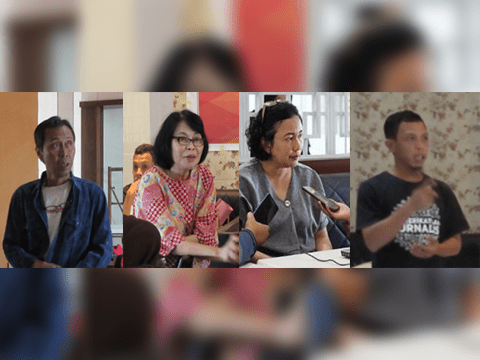PALU, Central Sulawesi, 4 December 2018: Women are strong and resilient. After disaster, women would continue their chores to collect water for drinking, cooking and bathing; to find food or other assistance. They are resourcefull members of families, communities and society. “However, their vulnerabilites and voices, ideas are often overlooked in emergencies and rehab-recon phases. Media have responsibility to highlight women’s and rights issues to shape decision making process,” said senior writter Maria Hartiningsih at the training for journalists on Human Rights and Gender Equality for Development.
Since they too are survivors and members of communities, they witness first hand the difficult living conditions in their respective communities, including the plight of women and children. As watchdogs, journalists have opportunities to raise to decision makers and in various decision making fora, rights and gender issues in IDPs camps, temporary settlements in the rehab-recon phase and subsequent development effort. “They (journalists) can influence policies that are gender insensitive and can promote a bottom up approach in the commonly top-down decision process,” she added.
With sound rights and gender awareness, journalists can contribute meaningfully to advocacy efforts to mainstream rights & gender in the rehab-recon and long-term development phases. “Their role is instrumental to stimulating policy discussion and mobilizing effort so that the needs, rights and engagement of women and marginalized groups are addressed and protected” explained Maria Endah Hulupi, UNFPA Communications Officer for Humanitarian.
Ridwan Lapasere, the Independent Journalists Association (AJI)’s Coordinator for Eastern Indonesia Region, expressed his hope that after the training, journalists would be able to actively promote rights and gender issues, which have so far been viewed as less popular, compared to law, crimes, politics and sports, in the editorial meetings.
Similarly, photojournalist Basri Muzakir said that visual communications should also respect rights and gender equality principles. “We should not sensationalize other people’s pain and suffering, including displaced women and survivors of gender-based violence. We should protect their rights and privacy; and portray their hope, strength and spirit to cope and survive, instead.”


